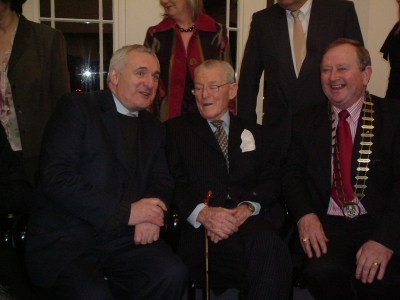Latest posts by Dermot Davitt (see all)
- A celebration of speed and sumptuous Qatari hospitality - October 8, 2023
- ‘Pura vida’ – A captivating Costa Rican experience - March 23, 2023
- Rum, food and music – a cultural tour of discovery in Jamaica - March 1, 2023
In the days since the passing of Dr. Brendan O’Regan, founding father of airport duty free, the outpouring of grief here in Ireland has been remarkable, and profound.
For people in the duty free business, of course, he was a symbol of our channel’s beginnings in 1947, when he opened the first airport duty free outlet – a small kiosk at the time – at Shannon Airport.
But that was just the beginning of his influence on Irish life. In 1950 he travelled to the US as part of a team under the post-war Marshall Aid Plan, a visit that had a major effect on his thinking. He returned with the blueprint for Shannon’s development as an economic free zone, which encouraged foreign investment in the region and helped Shannon become an industrial hub.
And the ripple effect of that move is still being felt. Shannon Free Zone was part of the inspiration behind the creation of
Dr O’Regan was also ahead of his time in recognising how tourist revenues could benefit from modern facilities and infrastructure. In 1957 his Sales & Catering Organisation (which was later integrated into Irish airports group Aer Rianta) took on the additional tasks of developing hotels and other amenities to support tourism in the Shannon region.
Dr O’Regan was rewarded with the chairmanship of Bord Failte, the Irish Tourist Board, in the same year – and initiatives included the renovation of the famed Bunratty Folk Park, and the Irish Rent-a-Cottage scheme, which helped regenerate villages and communities in the area.
And then there was Dr O’Regan’s role in the Irish peace process. He was the founder of Co-operation Ireland – the single largest organisation working in the area of peace and reconciliation in the island of Ireland – and a body that played a key role in the peace that has come to Northern Ireland in recent years.I was present at the opening of Dr O’Regan’s archives at the Clare Museum in Ennis in February 2007, an event that underlined the reverence in which he was held. It was a dirty, wet night, typical of Ireland’s west at that time of year. But the people of Clare came out in huge numbers to honour one of their most famous sons.
After a lifetime of cajoling, bargaining and demanding action from governments – over peace, over tourism investment, and yes, over duty free – it was fascinating to watch the ease with which Dr O’Regan mixed with Ireland’s senior politicians that night, and the huge esteem in which he was held by them. Irish Prime Minister Bertie Ahern (pictured above with Dr O’Regan and then Mayor of Clare Flan Garvey) made the keynote address, saying: “Dr O’Regan is a famous, famous person and one that any of us in public life would be proud to be associated with.
“This country is a different place today, where people no longer have to emigrate, but can stay and build. But they are building on foundations laid in other days, by men like Dr O’Regan. He is a rare individual.”
Fine words, which did justice to Dr O’Regan’s contribution to Irish life. Yet talking to Dr O’Regan later that night, as the crowd died down around him, I got the impression that the reaction from his Clare county men and women – and the natives of his own village of Sixmilebridge – meant as much, if not more to him.
Perhaps that helps explain his popularity, and lasting influence. He mixed easily with presidents and prime ministers, but he was always a man of the people.

